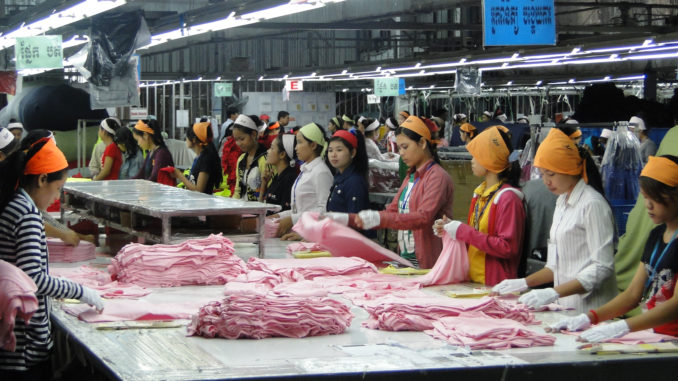
Case Number and Name: 027/17-Can Sport Shoes Co., Ltd.
Date of Award Issuance: 7 August 2017
In this case, the workers of Can Sport Shoes Co., Ltd. (the “Claimants”) brought four claims against the respondent Can Sport Shoes Co., Ltd. (the “Employer”) demanding improvement of four working conditions. The Employer’s enterprise is located in Kampong Chhnang Province and its core business is shoe manufacturing. At the time this case was heard, approximately 7,770 workers were employed.
Of the four claims in this case, one was settled by mutual agreement during the arbitration process and the Arbitration Council considered only the three remaining claims. This case note will examine one claim regarding the Employer’s management prerogative where workers were required to wear covered sandals with a strap to ensure their safety and prevent work-related accidents at the workplace.
The Employer’s enterprise practice was to require the workers to wear covered sandals with a strap to ensure their safety and prevent them from such work related-accidents such as slipping, objects falling on legs and toes, electrical shocks, etc. The workers were required to purchase the sandals at their own expense. The Claimants argued that they could not afford the sandals, reasoning that they were not only expensive, but also easily damaged as the straps broke off. Further, as it was the Employer’s requirement, the Employer should be responsible for purchasing and providing the sandals for the workers, and that if the Employer refused to do so, the workers demanded the Employer allow them to wear sandals without a strap.
Regarding this claim, the Arbitration Council considered whether or not, under its management prerogative, the Employer’s requirement for workers to purchase, at their own expense, and wear covered sandals with a strap for the purpose of protecting themselves was lawful.
Under its management prerogative, the Employer required workers to wear covered sandals with a strap for the purpose of protecting themselves:
Pursuant to Article 2, Paragraph 2 of the Labour Law, regarding the Employer’s management prerogative, the Arbitration Council surmised that the Employer had the right and power to supervise and direct the enterprise; however, this supervision and direction must be made in accordance with the law and be reasonable.
Article 249, Paragraph 1, of the Labour Law, holds enterprise managers liable for all work-related accidents, as detailed in the Labour Law, regardless of the personal status of each worker.
Additionally, Article 250 of the Labour Law stipulates that every enterprise manager shall manage or have someone take all appropriate measures to prevent work-related accidents.
The Arbitration Council found no evidence or expert-conducted research which proved that the requirement for workers to wear covered sandals with a strap was a necessary measure to improve the safety of workers and protect them from work-related accidents. Additionally, both the Employer and the workers confirmed to the Arbitration Council that when the Labour Inspector inspected the enterprise for workplace safety measures, the Labour Inspector did not report or release any instruction regarding the workers’ wearing of sandals in the enterprise.
The above findings of fact were vitally important for the Arbitration Council’s consideration and subsequent view that the supervision and direction of the workers to wear covered sandals with a strap at the workplace was not made in accordance with the law, and was unreasonable because the Employer failed to prove it was a necessary measure to improve worker safety and protect them from work-related accidents.
Under its management prerogative, the Employer required workers to purchase covered sandals with a strap at the workers own expense:
With respect to its consideration based on legal causes, the Arbitration Council found that it was the Employer’s obligation and responsibility to introduce measures to protect the workers’ safety and prevent them from work-related accidents at the workplace. However, the requirement for the workers to purchase the sandals at their own expense didn’t comply with the law and was unreasonable. The Arbitration Council was of the opinion that to protect the safety of the workers at the workplace, the Employer should have taken other proper measures in line with the provisions of the Labour Law rather than require the workers to wear covered sandals with a strap.
Pursuant to Article 34, Point D, of Prakas No. 099 on the Arbitration Council, dated 21 April 2004, the Arbitration Panel has the power and authority to order immediate cessation of any illegal conduct.
In conclusion, the Arbitration Council ordered the Employer to cease the practice of requiring the workers to wear covered sandals with a strap at the workplace, and that the Employer allow the workers to wear sandals without straps (covered or uncovered) at the workplace.
This case highlighted that the Employer has the right and power to supervise and direct the enterprise or establishment; however, this supervision and direction must be made in accordance with the law and be reasonable. In this respect, the Labour Law clearly states that it is the Employer’s burden and obligation to introduce measures to ensure worker safety and protect them from work-related accidents. The supervision and direction of the measures shall respond to actual situations and safety needs with regard to working conditions, as well as production lines of the Employer. The Employer’s failure to provide sufficient evidence to add weight to its demand meant the Arbitration Council could not make a decision as demanded by the Employer. Moreover, the burden of the cost of the sandals shouldn’t fall on the workers in order for the Employer to meet its responsibility to take measures to protect the safety and prevent work-related accidents, which are the obligation of the Employer.



